- Home
- Tanya Anne Crosby
Kissed; Christian Page 27
Kissed; Christian Read online
Page 27
She slumped over the letter. She tried so hard to be everything everyone wanted her to be—the best daughter, the best girlfriend—she shouldn’t wear her décolletage too high, or too low. She wasn’t supposed to weep, nor was she supposed to laugh too loudly.
She set down her own letter from Harlan, with all its sweet lies, on the desktop, and kept the other in hand, unwilling to relinquish the damning evidence, forgetting just for an instant to keep her shoulders even—a lady never slumped, you see, not even in the most distressing of situations.
“Is everything quite all right, Miss Sophia?”
Sophie straightened and looked reassuringly at their longtime butler, Harold, who stood in the doorway. In her parents’ eternal absence, Sophie was the lady of the manor. She had been groomed well by her mother, and she managed the household meticulously, but it was only in that very instant, as Harold looked in upon her, that she suddenly wondered who exactly was looking after whom.
“Everything is fine, Harold,” she assured. “I’m fine,” she lied.
He cocked his head at her as though he didn’t quite believe her. “Are you quite certain, Miss Sophia?”
Sophie waved him away, choking on a wave of grief. “Quite. It’s nothing I can’t manage.”
The older man smiled affectionately at her. “As always, Miss Sophia.” He cast a suspicious glance at Jonathon and left, assuring her, “I shall be right here in the hall should you require my presence.”
Sophie smiled to herself. Harold was, as ever, her guardian angel. If she knew him well—and, indeed, she did—he would, in fact, remain just outside the door, dusting the same picture frame over and over until Jonathon Preston left the premises. In fact, were it up to Harold, he would have never have allowed Jonathon entrance at all. Harold was far more protective of her than even her own father. But then her father and mother always expected her to do the right thing. They never doubted for an instant that Sophie would always adhere to her good breeding.
“Sophia,” Jonathon prompted.
Sophie looked up at him. He seemed suddenly to take up far too much of her breathing space.
All at once everything seemed far too confining—her father’s house, her predictable manners, even her dress.
She had every right to be angry!
Why couldn’t she ever allow herself a single instant of real emotion? Why must she always be perfect? Always be strong? Always do the right thing? She wanted to shout and cry and break things! She eyed a photo of Harlan on her desk and didn’t dare touch it.
She sucked in a breath and stood calmly, clutching Jonathon’s letter to her breast. Her fingers unconsciously curled about the parchment, crinkling the fine paper. Fury constricted her throat—not sorrow, not fear, but unrelieved fury.
How dare Harlan take advantage of her father!
How dare he use and discard them both so easily!
“Oh, dear! I see how much this has upset you, Sophie. Perhaps I should not have come,” Jonathon proposed. He set a hand gingerly upon her shoulder.
Sophie shrugged out from under his touch and brushed past him, swallowing her temper, trying to regain her composure.
Three years ago, with her mother’s and her father’s avid blessings, she had promised herself to Harlan. Three years and two months she had waited for him to come home and marry her, so that she could go and make them another perfect home. She had gladly rebuffed the advances of all her would-be suitors until every last one of her friends was wed, and only Sophie remained. And still she had waited, content in the knowledge that her darling Harlan would someday return from some faraway exotic land to claim her for his bride—like some knight in shining armor.
Poppycock!
They were supposed to have lived happily ever after... together with three children and a miniature pony for their daughter—all nothing but a young girl’s foolishness!
And, yes, indeed, she had been a young girl when Harlan had left Boston, but she was twenty-three now, and no longer some giddy school-miss with girlish dreams meant to be broken. No longer was she content to make do with straggled letters intended to keep her on a shelf!
Harlan thought he was so smart, did he?
Jonathon’s company was the only company he sorely missed, was it?
Well, Sophie had more pride than to allow him to discard her at will, only to reclaim her when it pleased him! She wasn’t about to give him the satisfaction!
“Please believe me… I never intended to join him, Sophia,” Jonathon reassured her, his tone reproachful of Harlan. “I could never join in his unconscionable sophistry against your father!”
Sophie narrowed her eyes at Jonathon. She was just about tired of hearing about her father! Why was everything always about her father, his money, his connections, his name? She decided in that instant that she would never again allow herself to be party to such an arrangement—even if it meant she would spend every day of the rest of her life completely alone! If a man could not love her for herself, then she just didn’t want him!
In fact, she rather liked the idea of being alone! And why shouldn’t she? She didn’t really need a man in her life!
She only wished Harlan were here so she could rip up his letter and toss it into his face—along with his wretched engagement ring and a few well-chosen words.
She felt almost giddy at the thought, empowered with the decision to forsake the wretch.
“Sophia,” Jonathon pleaded. “Please don’t weep, my dear.”
Startled by his request, Sophie straightened her shoulders. Weep? Oh, but she wasn’t weeping!
Though she could certainly understand why he thought so, with her back to him and her head bowed as it was. Her brows drew together suddenly as a thought occurred to her.
Why, indeed, wasn’t she weeping?
Maybe she was simply in shock?
Yes, that must be it; she would break down later when Jonathon left. And then she would sit down and write a scathing letter to Harlan, breaking off their engagement once and for all—she only wished she could be there to see his face when he read it—the rat! She wasn’t about to wait about like some ninny for her fiancé to deign to return, simply to tell him to go to the devil. She absolutely would not put her life on hold one instant longer!
It was Sophie’s father’s money and connections that had won Harlan his prestigious grants, and Sophie had supported Harlan with all her heart, wishing him to be happy in all his endeavors, and now it just wasn’t good enough to simply see his grants declined.
Resentment sidled through her.
Perhaps he wouldn’t regret losing her, but he would regret losing her father’s support—although she didn’t precisely know what her father would say about all this. She had no idea if he would support her or if he would endeavor to convince her that Harlan meant no harm... that all men strayed... that it bore no reflection on his feelings for her... but for the first time in Sophie’s life, she intended to take a stand. She was quite untreatably weary of being the good daughter!
A devilish thought suddenly occurred to her.
Why, indeed, should she wait for Harlan to return? Furthermore, why should she twiddle her thumbs until her father and mother returned from Paris to convince her everything was fine? Why shouldn’t she see Harlan’s face when she tore up his damning letter? In fact, why should she send the letter at all when she could take it to him?
She turned slowly to face Jonathon, her thoughts stewing, her eyes narrowed. “I wasn’t crying,” she assured him.
“It seems y-you’re angry,” he sputtered.
Sophie lifted a brow. “Quite!”
“Sophia, my dear... I-I’ve never seen you like this,” he managed to say.
Sophia had never felt quite like this.
With Harlan’s betrayal, something snapped inside her, something slightly terrifying and exciting all at once. The simple fact that she wasn’t huddled in a weepy pile at her desk and sobbing should have alarmed her as much as it seemed to shock J
onathon. The poor man was staring at her, mouth agape.
Sophie tried for an even tone as she dismissed him. The sooner he left her, the sooner she could begin making plans. “Thank you so much, Jonathon, for bringing this matter to my attention.” She straightened the parchment against her breast, ironing it neatly, resolved in what she must do.
She wanted to see Harlan beg for her father’s money! She wanted him to fall at her feet and endeavor to convince her to stay with him. And most of all, she wanted to rip his letter into a thousand little pieces, and then walk away forever.
“Sophia,” Jonathon began, taking a step backward as she neared. Sophie couldn’t help but note his confused reaction. He’d obviously expected a far different response from her. “I think perhaps you are in shock,” he said, recovering himself, and planting his feet firmly.
Sophie smiled thinly. No doubt he thought so.
Certainly it was unheard of that a woman should respond to such a case with anything other than pure hysteria, she thought irately.
“I’m perfectly fine,” she assured her fiancé’s best friend, flashing him a smile meant to placate, even if her eyes burned with wrath. “You may go now, and please, please, do not trouble yourself further, Jonathon.”
“Oh, but I must stay!” he protested at once. “How can I come to you bearing such horrid news and simply leave you disconsolate? You need comfort, my dear—comfort and friendship! And I am here to give it to you!”
Sophie folded the letter with cool deliberation. “As you can see ... I am hardly disconsolate.”
“But Sophia, my dear... this is quite unlike you!”
Sophie smiled. “Why, yes, it is!” she agreed, and batted her lashes at him, feeling quite the shrew, though with ample justification. Men! Her father included, all of them were despotic by nature! Well, she was quite through being a door mat!
She went to Jonathon, laying a hand upon his arm. She gripped him firmly and pulled him toward the door. “Thank you, dear Jon, for considering me in this.”
He had no choice but to follow... or make a scene, and Jonathan, like Harlan, had no stomach for embarrassing spectacles.
Her mind at once began to make plans. First she would pay a visit to this Jack MacAuley Harlan had mentioned in his letter. Someone at the university would know how to locate him. Then she would need to pack. And money—she would need money, of course. And she would write a letter to her mother and father so they wouldn’t worry when they returned and found her gone. Come to think of it, they probably wouldn’t even notice, but she should write them anyway. It was the proper thing to do, and, of course, she always did the proper thing.
She wondered about Jack MacAuley. She’d heard his name mentioned before—a controversial fellow her father had called him, and had heartily disavowed his theories—though Sophie didn’t much care if he thought himself descended from blue monkeys; he’d do very well for her purposes. If he could be bribed to take her aboard his vessel, she certainly had the means to do so.
She hurried Jonathon along. “My father will much appreciate your ... integrity,” she told him, seeing him to the door, “and you can be certain I will tell him how sweet you were to consider my—our—interests.”
“Of course,” Jonathon replied, nodding, confusion furrowing his brow. And then he looked down his nose at her with that familiar mocking arrogance that always managed to clench her jaw. “My dear... would you like me to return and bear witness while you tell your father?” His tone was quite hopeful, but she knew his offer had nothing to do with any concern for her. He wanted her father to know what he had done—that he had betrayed Harlan for his daughter’s honor—for Vanderwahl honor.
“Oh, no, no!” Sophie replied, patting his arm reassuringly. “It will go much better if you are nowhere near when he reads Harlan’s letter, Jonathon. Trust me, he will be quite apoplectic, I assure you! I would sorely regret it if you were the one to endure the brunt of his wrath in Harlan’s stead. After all, you were only looking out for my best interests ... isn’t that true?” She gave him a canny glance. Sophie hoped the question filled him with guilt, although she knew a moment’s discomfort was the most she could hope for. She was coming to understand that women meant little to men like Jonathon and Harlan. Women were mere pawns—expendable for the greater good.
She smiled to see that he nodded jerkily. “Yes ... yes, indeed ... that wouldn’t be good at all.” And he withdrew a kerchief from his pocket, dabbing his brow.
Sophie nodded portentously. “As you know, Father is quite protective.” And he was, indeed, fiercely protective of their name.
“Of course,” Jonathon replied as Sophie opened the door. “As it should be... as it should be.” His brows drew together, and he hesitated, clearly uncertain over the fruit of his labors. She knew it had not gone quite as he’d hoped. She ought to let him be there when her father read Harlan’s letter. It would serve him well to witness Maxwell Vanderwahl’s wrath... except that Sophie wasn’t about to show her father the letter... not yet.
She lifted Jonathon’s hat from the rack by the door and set it atop his head, smiling up at him. She patted it firmly. “Goodbye, dear Jon!” she declared.
Her mother would have been quite proud to see how well she kept her calm.
She opened the door wider, barely restraining herself from shoving him out into the street and rushing up the stairs. She was suddenly eager to begin preparations.
Her parents would be in Paris until the end of the month. By the time they returned, it would be too late to stop her. She was no longer a child and she certainly had every right to deal with her fiancé any way she felt appropriate—even if it wasn’t quite appropriate.
Jonathon took a step out the door, then stepped back over the threshold, barring her from closing the door. “B-But if your father isn’t here, Sophia, then perhaps I should stay! To be certain you don’t become too disheartened.”
Sophie pushed him gently out the door. “No, but thank you!”
Harold, God bless him, made himself known in that instant, standing like a sentinel at the end of the hall. He said nothing but cleared his throat discreetly, and Jonathon remembered himself at once.
“Goodbye!” she said firmly when he opened his mouth to protest.
“Yes... very well, then... goodbye,” he stammered, and left at last.
Sophie slammed the door behind him. She turned to lean against it and in an instant of weakness, tears pricked at her eyes as she clutched the letter. She felt ill-used and trampled, but she refused to feel this way for long.
Harold stood looking at her with his hands behind his back.
“If I may be so bold to say so, Miss Sophia, I have never liked that young man!”
She smiled gently at him. “I know. That will be all, Harold,” she said, dismissing him. When he was gone, she hurried up the stairwell.
The one thing she had determined long ago was that one could lose anything at all—anything, except one’s pride—and come back relatively unscathed. She wasn’t about to carry this scar throughout her lifetime, only to end up bitter and alone at fifty and stealing brandy from her father’s cabinets.
No, that wouldn’t do.
She went to her room, closing the door behind her. It was meticulous, except for the drawings posted everywhere—on the dresser mirror, on the walls. They were her drawings, and much to her mother’s dismay, she hung them everywhere. It was Sophie’s one small rebellion, but she was proud of every sketch and couldn’t bring herself to bury them in a closet or in a drawer.
Sophie never drew things as they actually appeared. She never truly saw anything the way others did. Everyone—every thing—had a soul, and she felt it her mission to capture its essence in her sketches.
She made her way to her dresser, and touched a finger to a sketch of her mother she had posted there. Unfortunately, sometimes her portraits weren’t particularly flattering. She smiled to herself at the memory of her mother’s expression when she’d first g
azed upon her portrait. Poor dear, she’d practically fainted at the sight of it. Sophie had sketched her mother’s eyes abnormally large, because she was ever vigilant, and often affronted. And her mouth was big as well, and her ears... and her nose. Sophie just hadn’t been able to help herself. Her mother seemed to hear everything, smell everything, know everything—or at least she made it a point to try.
Sophie’s sketches would never hang in an art gallery, but she loved them all—from her re-interpretation of the Mona Lisa, with her teeth bared in laughter, to the tiny sketch of her cherished shark’s tooth that hung over her bed like a halo-crowned portrait of the Virgin Mary. Sophie turned to consider the sketch. It was all she had left of the shark’s tooth. Her mother found the tooth one morning and discarded it long before Sophie had awakened—because it wasn’t seemly to play with the dirty teeth of dead animals, she’d been reprimanded.
Sophie still missed her little talisman. In some strange way, the little tooth had embodied all her hopes and dreams—not the ones she had been schooled to, but those she’d tucked away in the farthest reaches of her soul, deep down inside where not a single ray of light could expose their imperfections ... or hers. The truth was that she wasn’t perfect—never would be—and she knew it.
Just once, she wanted someone to look beneath the facade and see all the imperfections ... and cherish her anyway.
She lifted up the portrait from her desk – the one she had sketched of Harlan, touching the chin with a finger. She had drawn him perfectly.
This portrait, along with the only drawing of hers that her mother had hung in the hall, were the only two paintings Sophie had rendered to absolute perfection. Simply titled The Wedding Day, the one in the hall was a storybook picture—her wedding day as Sophie had often envisioned it. Since childhood, her mother had woven every precise detail for her, until the vision had reached an almost sanctified perfection. The pristine white gazebo, decorated with pure snow-white ribbons. The golden rays of sunshine penetrating a vibrant, rich green canopy of trees… shining down on the faceless couple within the gazebo. The rays had been so brilliant as they’d shone on the wedded pair that it had washed away every detail in their faces, rendering them completely without identity.

 Lord of Shadows (Daughters of Avalon Book 5)
Lord of Shadows (Daughters of Avalon Book 5) To Love a Lord: A Victorian Romance Collection
To Love a Lord: A Victorian Romance Collection The Daughters of Avalon Collection: Books 1 & 2
The Daughters of Avalon Collection: Books 1 & 2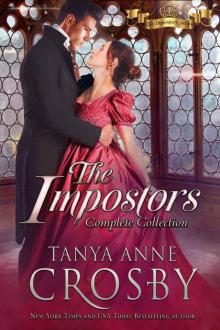 The Impostors: Complete Collection
The Impostors: Complete Collection The Holly & the Ivy (Daughters of Avalon Book 2)
The Holly & the Ivy (Daughters of Avalon Book 2)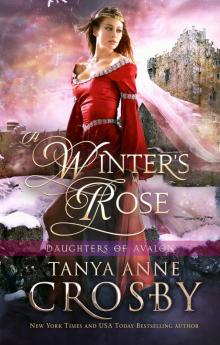 A Winter’s Rose
A Winter’s Rose Fire Song (Daughters of Avalon Book 4)
Fire Song (Daughters of Avalon Book 4) Elizabet
Elizabet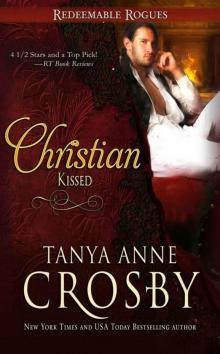 Kissed; Christian
Kissed; Christian Once Upon a Knight
Once Upon a Knight Viking: Legends of the North: A Limited Edition Boxed Set
Viking: Legends of the North: A Limited Edition Boxed Set Five Unforgettable Knights (5 Medieval Romance Novels)
Five Unforgettable Knights (5 Medieval Romance Novels)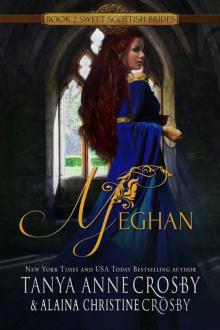 Meghan: A Sweet Scottish Medieval Romance
Meghan: A Sweet Scottish Medieval Romance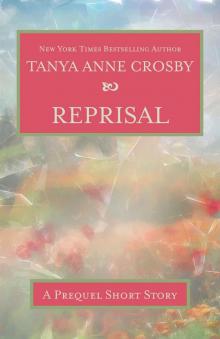 Reprisal: A Prequel Short Story to REDEMPTION SONG
Reprisal: A Prequel Short Story to REDEMPTION SONG Highland Song
Highland Song The Summer Star: One Legend, Three Enchanting Novellas (Legends of Scotland Book 2)
The Summer Star: One Legend, Three Enchanting Novellas (Legends of Scotland Book 2) Once Upon a Kiss
Once Upon a Kiss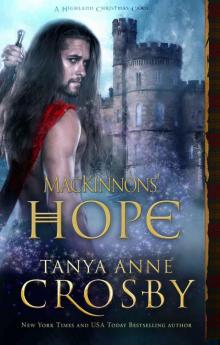 MacKinnons' Hope: A Highland Christmas Carol
MacKinnons' Hope: A Highland Christmas Carol The MacKinnon's Bride
The MacKinnon's Bride Highland Brides 04 - Lion Heart
Highland Brides 04 - Lion Heart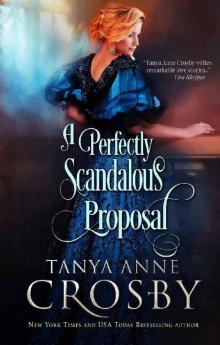 A Perfectly Scandalous Proposal (Redeemable Rogues Book 6)
A Perfectly Scandalous Proposal (Redeemable Rogues Book 6) Reprisal
Reprisal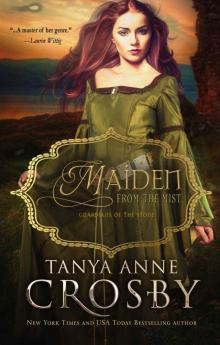 Maiden from the Mist (Guardians of the Stone Book 4)
Maiden from the Mist (Guardians of the Stone Book 4)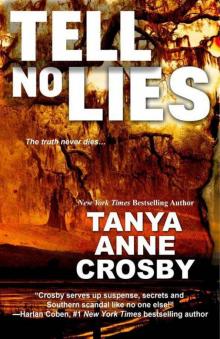 Tell No Lies
Tell No Lies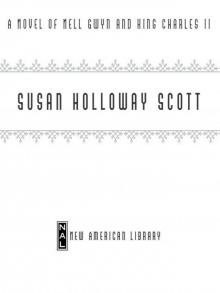 The King's Favorite
The King's Favorite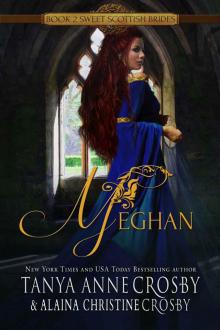 Meghan: A Sweet Scottish Medieval Romance (Sweet Scottish Brides Book 2)
Meghan: A Sweet Scottish Medieval Romance (Sweet Scottish Brides Book 2)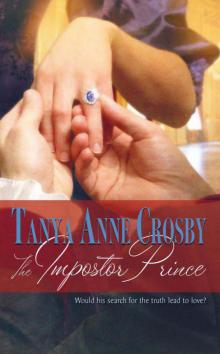 The Impostor Prince
The Impostor Prince Happily Ever After
Happily Ever After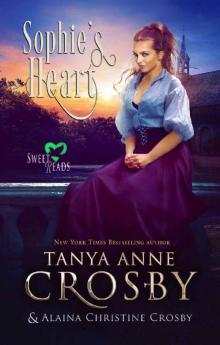 Sophie's Heart: Sweet Historical Romances
Sophie's Heart: Sweet Historical Romances Viking's Prize
Viking's Prize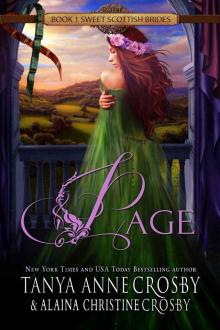 Page
Page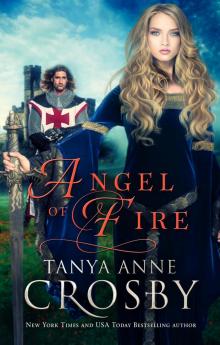 Angel of Fire
Angel of Fire Once Upon A Highland Legend
Once Upon A Highland Legend Highland Brides 03 - On Bended Knee
Highland Brides 03 - On Bended Knee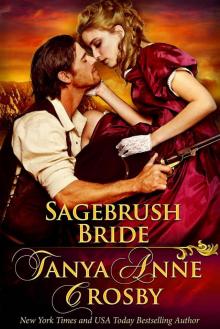 Sagebrush Bride
Sagebrush Bride Lyon's Gift
Lyon's Gift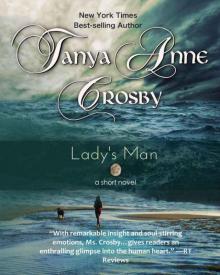 Lady's Man
Lady's Man The King's Favorite (Daughters of Avalon Book 1)
The King's Favorite (Daughters of Avalon Book 1) Highland Storm
Highland Storm Redemption Song
Redemption Song Three Redeemable Rogues
Three Redeemable Rogues